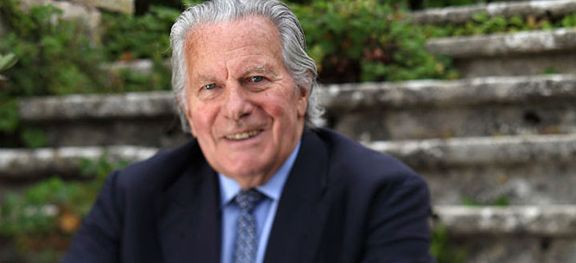Anthony Barton 1930–2022

A great man of the Médoc remembered.
With the demise of Anthony Barton this week the Bordeaux wine trade has lost its most genuinely entertaining, and handsome, participant. The great thing about Anthony was that he always saw himself as an outsider, so was able to comment wryly and dispassionately about the very closed, introvert world of Bordeaux – perhaps partly because he didn’t live in the city.
He was the most prominent of the descendants of the ‘wild geese’, Irish Protestants who settled in Bordeaux, in the case of Anthony’s antecedent Thomas, whose arrival in Bordeaux as long ago as 1722 was followed by a lucrative career shipping claret back to the British Isles. As Anthony’s bosom buddy Jean-Michel Cazes of Ch Lynch-Bages pointed out at the wonderful dinner held to celebrate Anthony’s elevation to Decanter Man of the Year in 2007, described here, Cazes always felt a terrible arriviste compared with the owner of Chx Léoville Barton and Langoa Barton. (His family arrived in Pauillac in the early years of the last century.)
Anthony lived in the beautiful, evocatively furnished Langoa on the outskirts of St-Julien (on a rather dangerous bend) all his life, once he had succeeded his difficult uncle Ronald Barton in 1986. The transaction was overseen by a Danish associate. He was one of relatively few Médoc château owners to live above the shop, in his case the cellars in which both Langoa and Léoville Barton are made.
The wines, especially Léoville Barton, are models of restrained but concentrated claret and, much to the dismay of some in the Bordeaux trade, have the reputation of being sensibly priced.
He was a real sport. When we filmed Jancis Robinson's Wine Course for the BBC in Bordeaux in the 1990s, he gamely agreed to drive interminably around the Médoc with me, being filmed. I think it was on this long journey that he told me ruefully (or perhaps naughtily) that he had never been invited to a meal at Mouton by Baroness Philippine de Rothschild, believing it was because he was merely of second-growth status. Naughty is a pretty good description of him. I also remember the tale of his receiving a group of, I think, Japanese sommeliers who were hanging on, and recording, his every word. He was required to describe every wine he served them and by the time he got to the last, had rather run of out of descriptors. He looked outside the tasting room and saw his gardener deadheading tulips, so decided to tell them, deadpan, that he thought the wine tasted of dead tulips. There will be a note of that in some Japanese notebooks.
Before he became ill he and his Danish wife Eva were inveterate travellers, to Scandinavia, Ireland and to the United Sates in particular. I remember attending various wine events in the US with him and Cazes, and dining with the pair of wine producers in their Bordeaux ‘canteen’ (before Cazes opened the glamorous hotel-restaurant Ch Cordeillan Bages in Pauillac), the Lion d’Or in Arsins.
A highlight of our own travels was the day in 2015 that Nick and I lunched at Langoa, following, I’m sure, in a long line of international guests. It is a most beautiful property with enviable gardens and a kitchen overseen by Eva. We had a great aperitif and lunch at which my strongest memory is of a fish mousse and of the Ch Léoville Barton 1985, Anthony’s debut vintage described in my recent account of a 1950s lunch. But he was already suffering from a mysterious lack of balance and, at about the cheese-course stage, excused himself and was led away by his major-domo, who clearly understood exactly what was needed.
Anthony and Eva’s daughter Lilian Barton Sartorius bought Ch Mauvesin Barton in Moulis in 2011 with her husband Michel, and their children Damien and Mélanie are now fully involved with the business, Damien being a notable supporter of sustainability in wine. Anthony and Eva’s son Thomas was killed tragically in a road accident and his memory lives on in a David Austin rose named after him.
Anthony deserves much to be named after him.
If you want to 'hear' more of Anthony Barton's inimitable voice, with its clipped vowels and distinctive take on life, read Decanter.com's profile and tributes that accompanied his Decanter Man of the Year accolade. Image courtesy of Clay McLachlan/Decanter.
Become a member to view this article and thousands more!
- 15,427 featured articles
- 274,507 wine reviews
- Maps from The World Atlas of Wine, 8th edition (RRP £50)
- The Oxford Companion to Wine, 5th edition (RRP £50)
- Members’ forum
- 15,427 featured articles
- 274,507 wine reviews
- Maps from The World Atlas of Wine, 8th edition (RRP £50)
- The Oxford Companion to Wine, 5th edition (RRP £50)
- Members’ forum
- Commercial use of our Tasting Notes
